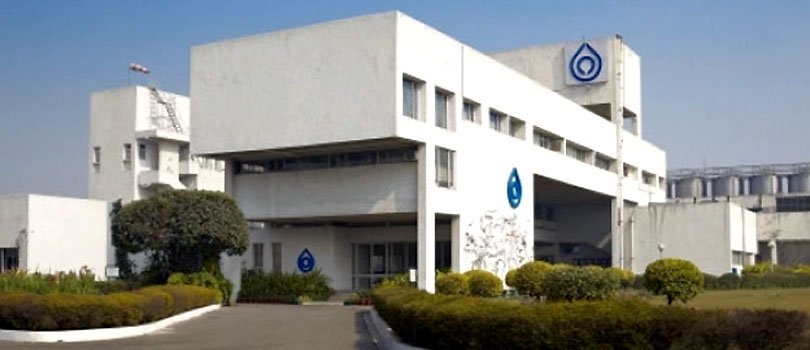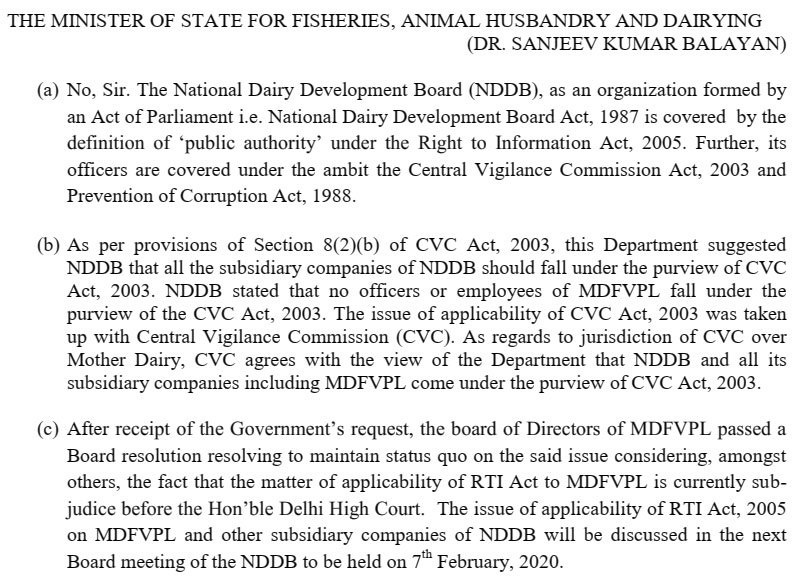NDDB and All Its Subsidiaries, including Mother Dairy, Come under CVC: Govt

National Dairy Development Board (NDDB) and all its subsidiaries, including Mother Dairy Fruit and Vegetables Ltd (Mother Dairy or MDFVPL), come under the purview of Central Vigilance Commission (CVC) Act, says the government.
Responding to a question in the Rajya Sabha, Dr Sanjeev Kumar Balayan, minister of state for fisheries, animal husbandry and dairying, says NDDB is covered under the definition of public authority under the Right to Information (RTI) Act and its officers are covered under the ambit of CVC Act and Prevention of Corruption (PC) Act.
Prof Manoj Kumar Jha, member of Parliament (MP) from Rajya Sabha, had asked questions about the applicability of RTI, CVC and PC Act on NDDB and its subsidiaries.
In a written reply in 7 February 2020, Dr Balayan said, “As per provisions of Section 8(2)(b) of CVC Act, 2003, this department suggested NDDB that all the subsidiary companies of NDDB should fall under the purview of CVC Act, 2003. NDDB stated that no officers or employees of MDFVPL fall under the purview of the CVC Act. The issue of applicability of CVC Act was taken up with CVC. As regards to jurisdiction of CVC over Mother Dairy, CVC agrees with the view of the Department that NDDB and all its subsidiary companies including MDFVPL come under the purview of CVC Act.”

As Moneylife had pointed out, although they were government organisations, NDDB and its subsidiaries were skilled at evading queries under the RTI Act. In fact, NDDB has, so far, managed a stay on the applicability of RTI and CVC Act on Mother Dairy for almost a decade.
On 15 April 2011, the Central Information Commission, in an order, had asked Mother Dairy to appoint a central public information officer (CPIO) and appellate authority (AA) as per mandate of RTI Act. NDDB challenged the CIC order in the Delhi High Court. On 2 February 2015, the HC dismissed appeal filed by Mother Dairy.
However, the minister stated that after receipt of the government’s request, the board of directors of MDFVPL passed a resolution resolving to maintain status quo on the said issue considering, amongst others, the fact that the matter of applicability of RTI Act to MDFVPL is currently sub-judice before the Delhi High Court. “The issue of applicability of RTI Act on MDFVPL and other subsidiary companies of NDDB will be discussed in the next Board meeting of the NDDB to be held on 7 February 2020,” the minister had stated in his latest reply.
Whether NDDB discussed the issue in its meeting is not known. That NDDB brazenly refuses to submit itself to RTI queries and the government does nothing about it, seems to suggest a tacit understanding between the two—otherwise it is hard to believe that a government organisation would be so defiant.
Separately, responding to another question on 7 February 2020, the minister said, based on a request from NDDB, the department authorised the project steering committee (PSC) to relax eligibility criteria for Bapudham Milk Producer Co.
According to insiders, NDDB gave a grant of Rs33 crore from National Dairy Plan (NDP)-phase-I to Bapudham Milk Producer Co even when the company was non-operational. This company was inaugurated by Radha Mohan Singh, former minister of agriculture as Motihari was his constituency. This explains why the PSC relaxed its criteria under the NDP.

“PSC in its meeting held on 21 July 2017, approved Bapudham MPC as an end implementing agency under NDP phase I after relaxing the eligibility criteria for milk producer companies. As per the decision of the PSC, fund under NDP-I was released to the Bapudham Milk Producer Co only after it was operationalised,” he says.
However, Dr Balayan, the minister, did not share the amount of funds provided to Bapudham Milk Producer Co by NDDB under the NDP phase-I.
Bapudham Milk Producer Co, located at Motihari in East Champaran district of Bihar, was operationalised on 2 October 2017.
Dilip Rath, chairman of NDDB, informed that, under NDP phase-I, NDDB has approved funding of Rs22 crore to the MPC for implementation of village-based milk procurement systems.
Source : moneylife


